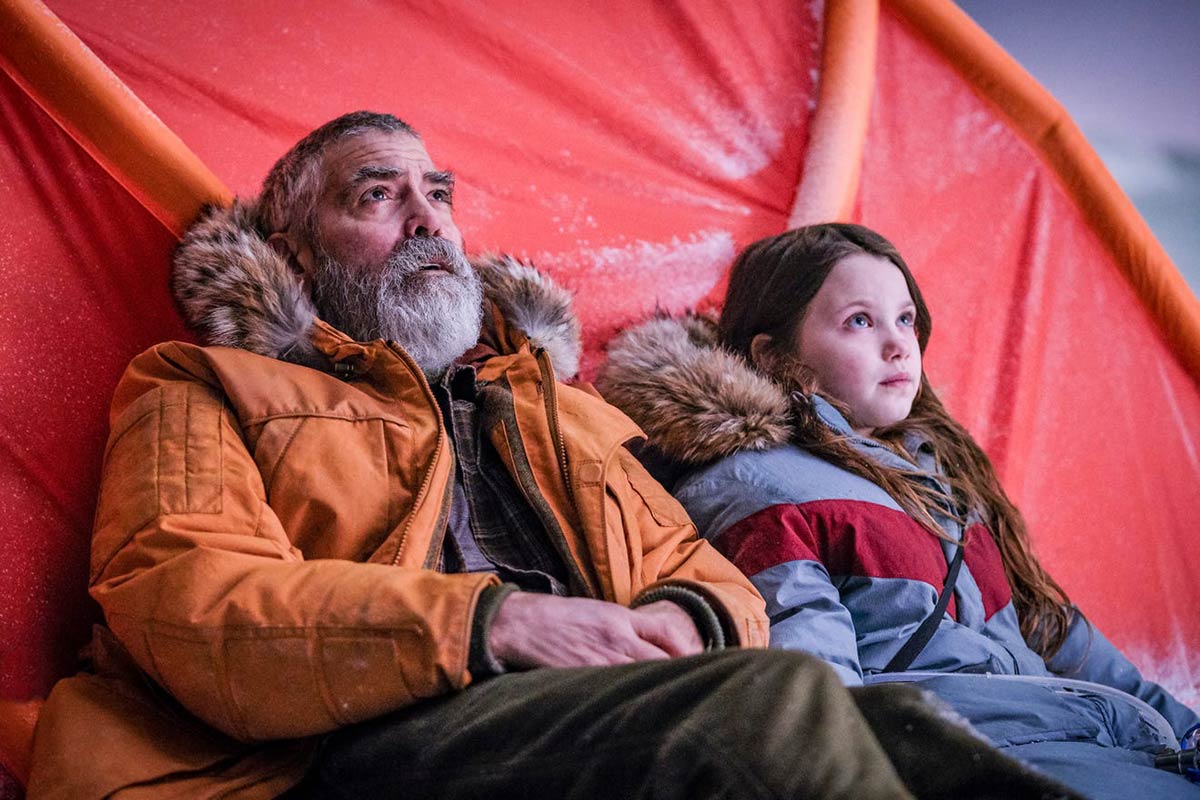Knowing that what we imagine is more terrifying than what we see, “The Midnight Sky” plays the end of the world pretty close to the vest, with nary a devastated cityscape to be seen. It is a canny move for a movie that pivots around an apocalyptic disaster, and one that pays off at times by refocusing the story from the spectacle of loss to its rending emotional reality. But while less-is-more tends to be a smart play when trying for awards season credibility, there are times when George Clooney’s latest directorial effort trips up on its own earnestness.
READ MORE: The 100 Best Sci-Fi Films Of All Time
Based on Lily Brooks-Dalton’s novel “Good Morning, Midnight,” “The Midnight Sky” is a two hander about isolated survivors in the year 2049 trying to contact each other before humanity blinks out of existence. Clooney plays Augustine, a famous scientist whose research inspired the ship Aether to launch into the solar system two years ago on a hunt for a human-habitable planet. When the movie opens, Aether has nearly completed its return voyage and bears good news: K-23, a previously undiscovered moon of Jupiter, can support human life. But once the ship is back in communication range, Augustine has bad news for them: there won’t be anybody left on Earth to colonize K-23.
READ MORE: The 100 Most Anticipated Films Of 2021
Augustine is isolated at an Arctic research station abandoned at the movie’s start by people fleeing the unspecified disaster called “The Event” which took place some weeks earlier and is shown only as flaming red clouds of radiation creeping ever closer. Determined to use the station’s communications equipment to warn Aether away from the spoiled Earth, Augustine stays behind despite having a terminal disease (also unspecified) that requires daily blood transfusions. “You won’t last a week,” he is told before being left to his own melancholy devices.
READ MORE: George Clooney Says The Rise Of Streaming Is “Nothing But Good” For Filmmakers And Actors
Bearded and hollow-eyed, Augustine wanders the station with a bottle of whiskey and an air of regret like a Santa Claus who has been reading the Book of Revelations and thinking that all its baroque punishments are well deserved. Despite the end of the world being nigh, he only truly panics after discovering that a young girl stayed behind in the station after the evacuation. Iris (Caoilinn Springall) does not speak, nor does she appear to be much work, but Augustine stills cannot manage her presence. “I’m the wrong person,” he tells the wide-eyed and oracular-seeming child in a tone less parental than pleading.
Even though the scenes with Augustine and Iris are a one-way conversation, occasionally spliced into by somewhat beside-the-point flashbacks showing a young Augustine (Ethan Peck) throwing away his one chance at true love, they carry more weight than the other half of the movie. The Aether’s crew is made up of blandly heroic characters like the commander (David Oyelowo) and his pregnant partner Sully (Felicity Jones). Only the possible wildcard of Mitchell (Kyle Chandler, barely hiding an iceberg’s worth of under-the-surface tension) breaking up the monotony. Even though the crew spent two years going to and from K-23, its discovery does not seem to have made much of an impression. Instead of delving into the crew’s interpersonal dynamics, the script substitutes cringey moments of togetherness (even in 2049, humanity will apparently still not be free from the curse of “Sweet Caroline”) as well as drama in the form of errant meteors that come crashing into their marvelously designed but highly delicate ship. Echoing “Gravity” at times, though ironically without the bracing and balancing wit that Clooney brought to that story as an actor, ‘The Midnight Sky” handles its spaceship-in-crisis with a crisp efficiency that delivers less of a punch than they should.
As a director, Clooney feels more at home with the Earth-bound material than the struggles of the Aether. Having realized he needs a larger antenna to contact Aether, Augustine takes Iris with him on a snowstorm- and wolf-haunted journey to a nearby station. Heavy with guilt and regret, Clooney’s Augustine practically carries the weight of the movie in his eyes. Somehow everything that he does not say when trying to get through to Aether or talking with the silent Iris communicates the enormity of what has happened and what is at stake if the ship is unable to get back to K-23 with the last humans who have any chance of survival.
Shrouded in an elegiac reverie, “The Midnight Sky” is a frequently beautiful movie, from the mechanical ballet of the bird-like Aether to the brief glimpses of K-23, where Jupiter looms in a purplish night sky. But its inability to make a strong connection between the separated stories, and a tone that slips sometimes from poetic quietude to sentimentality, keep the movie from taking a long and honest look at the devastation its reticent mood only suggests. [B-]
“The Midnight Sky” premieres on Netflix on December 23.





